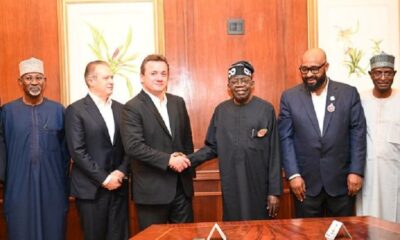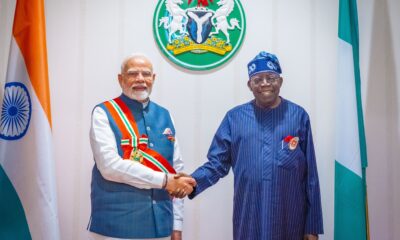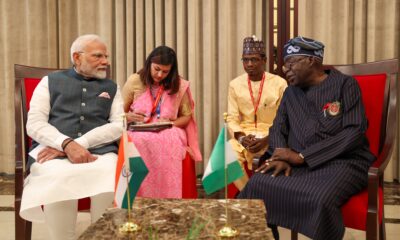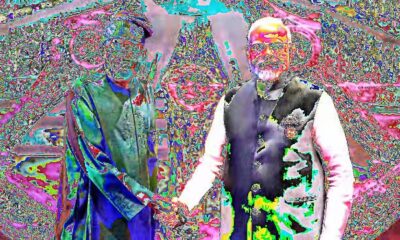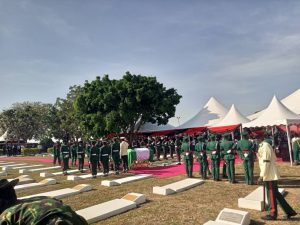NEWS
Why We Must Preserve Our Democracy – Being Full Text of President Tinubu’s 2024 National Democracy Day Broadcast
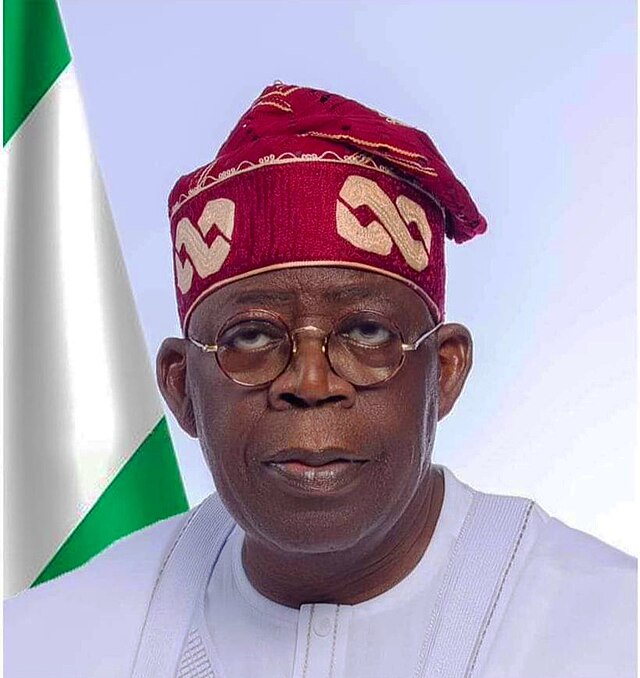
My fellow Nigerians, let me begin by congratulating all of us for witnessing the celebration of another Democracy Day today, the 12th day of June 2024. This year also marks our nation’s 25 years of uninterrupted democratic governance.
On this day, 31 years ago, we entered our rites of passage to becoming a true and enduring democratic society.
Going through this passage was hard and dangerous. During the fateful six years that followed, we fought and struggled for our natural rights as human beings put on this earth by the divine hand of our Creator.
We lost great heroes and heroines along the way. In this struggle, the winner of the June 12, 1993 presidential election, Chief MKO Abiola, the most significant symbol of our democratic struggle, his wife, Kudirat, General Shehu Musa Yar’Adua and Pa Alfred Rewane, among others sacrificed their very lives.
They bravely surrendered their futures, so that our nation might have a better one.
Let us honour the memories of Chief Anthony Enahoro, Chief Abraham Adesanya, Commodore Dan Suleiman, Chief Arthur Nwankwo, Chief Chukwuemeka Ezeife, Admiral Ndubuisi Kanu, Chief Frank Kokori, Chief Bola Ige, Chief Adekunle Ajasin, Chief Ganiyu Dawodu, Chief Ayo Fasanmi, Chief Gani Fawehinmi, Chief Olabiyi Durojaiye, Dr. Beko Ransome-Kuti, Chima Ubani, and others who have transited to the higher realm.
The sacrifices of General Alani Akinrinade, Professor Bolaji Akinyemi, Professor Wole Soyinka, Chief Ralph Obioha, Chief Cornelius Adebayo, among many others, should never be forgotten. For at least six years, they bore the pains and difficulties of life in exile.
While the exiled pro-democracy activists kept the fire burning, their comrades at home sustained the pressure on the military brass hats. Among the latter are Olisa Agbakoba, Femi Falana, Abdul Oroh, Senator Shehu Sani, Governor Uba Sani, Chief Olu Falae, and other National Democratic Coalition leaders such as Chief Ayo Adebanjo and Chief Ayo Opadokun.
The sacrifices they made, and the precious gift brought about by their selfless devotion can never be repaid. Neither shall it be forgotten.
We could not have won the battle against military dictatorship without the irrepressible Nigerian journalists who mounted the barricades along with the pro-democracy activists. We celebrate them today, along with their media establishments such as The Punch, Guardian, National Concord, Tribune, The News/Tempo, and TELL Magazines. Military authorities proscribed these media establishments and jailed their journalists for standing for free speech and civil liberties
Despite the lethal might of the military government, what appeared to be high and unyielding walls of dictatorship came tumbling down. The dismal fortress exists no longer.
The power of an idea, the power of the people proved more potent than all the guns and munitions, than all the guns, the munitions and the threats of the strongmen.
The nation exited the yoke of military rule in 1999 to become the most populous democracy on African soil, the beacon of democratic self-determination for the black race and one of the largest democracies in the world.
This change stands as a pivotal moment in human history. From this change, we shall never turn, nor shall the annals of mankind’s progress forget the sublime meaning of this great moment.
Today, 25 years later, we celebrate the silver anniversary of our journey in democracy.
We have steadied the course.
Democracy is neither a foreign nor abstract concept devoid of real-life meaning for us. Neither can we afford to reduce or minimalise it to being nothing but the mere holding of periodic elections where one candidate and party outdo another.
While elections attract dramatic attention, they are but one aspect of democracy. Democracy is a way of life that encompasses a broad outlook of which elections are but a part. As such, a nation can have elections without being democratic. But a nation cannot be truly democratic without holding elections.
That we have established a tradition of holding transparent, open, and fair elections gives credence to our democratic bearing. That we have experienced peaceful transitions of government affirms our democratic temperament.
Fellow Nigerians, true democracy shines its light into the daily lives of the people who live under its nurturing wings. It affords us the freedom and liberty to think as we want, live where we want and pursue whatever legitimate endeavour that suits us.
Democracy does not assume some false or forced unity of opinion. In fact, democracy assumes that conflicting ideas and differing opinions shall be the order of the day. Given the diversity and variety of the human experience, there must be diverse perspectives and viewpoints.
What democracy demands is that we do not resolve differences through force and repression. But we make allowance for the legitimacy of views that differ from our own.
Where other forms of government impose against the will of the people, democracy aims to make leaders sufficiently humble that they conduct themselves as servants of the common good, not as viceroys of the narrow interests of the mighty.
My dear compatriots, Nigeria faced a decision of untold gravity twenty-five years ago: Whether to veer toward a better destination or continue aimlessly in the fog of dictatorship.
We made the right choice then. We must continue with that choice now.
As Nigerians, we must remind ourselves that no matter how complicated democracy may be, it is the best form of governance in the long run. We must also be aware that there are those among us who will try to exploit current challenges to undermine, if not destroy, this democracy for which so much has already been given.
These people do this not to make things better but to subject all other people and things to their control and dominance until the point that, if you are not counted among their elite, then your life will be small and no longer owned by you.
This is the great battle of our day and the major reason we specially celebrate this Democracy day.
Fellow Nigerians, our Democracy is more than a historic fact. It is a living, breathing reality.
The true meaning of this day is not to focus solely on the great deeds of the past that have brought us to this point.
Yes, we pay eternal honour to those who laid down their lives, sacrificing everything to pave the way for the nation.
I stand uniquely placed in this regard. I was among those who took the risk to midwife the birth of our democracy. I am now a direct and obvious beneficiary of the fruits of those historic efforts.
As president of this nation, I am morally and constitutionally bound to preserve this precious form of governance. I vow to do my utmost best to protect your rights, freedoms, and liberties as citizens of Nigeria.
Even more than that, I pledge to do whatever is necessary to cement democracy as our way of life.
Although the challenges are steep and multiple, I am grateful to lead Nigeria at this moment in her history and point in her democratic journey.
I come before you also to declare that our most important work remains before us. This real test has never been whether we would rise to challenge the slings of misfortune and grievous pain of dictatorship.
The real test is whether we shall lower our guards as the shadow of despotism and its evident physical danger fade.
I say to you here and now that as we celebrate the enshrinement of our political democracy, let us commit ourselves to the fulfilment of its equally important counterpart, the realisation of our economic democracy.
I understand the economic difficulties we face as a nation.
Our economy has been in desperate need of reform for decades. It has been unbalanced because it was built on the flawed foundation of over-reliance on revenues from the exploitation of oil.
The reforms we have initiated are intended to create a stronger, better foundation for future growth. There is no doubt the reforms have occasioned hardship. Yet, they are necessary repairs required to fix the economy over the long run so that everyone has access to economic opportunity, fair pay and compensation for his endeavour and labour.
As we continue to reform the economy, I shall always listen to the people and will never turn my back on you.
In this spirit, we have negotiated in good faith and with open arms with organized labour on a new national minimum wage. We shall soon send an executive bill to the National Assembly to enshrine what has been agreed upon as part of our law for the next five years or less.
In the face of labour’s call for a national strike, we did not seek to oppress or crack down on the workers as a dictatorial government would have done. We chose the path of cooperation over conflict.
No one was arrested or threatened. Instead, the labour leadership was invited to break bread and negotiate toward a good-faith resolution.
Reasoned discussion and principled compromise are hallmarks of democracy. These themes shall continue to animate my policies and interaction with the constituent parts of our political economy.
I take on this vital task without fear or favour and I commit myself to this work until we have built a Nigeria where no man is oppressed.
In the end, our national greatness will not be achieved by travelling the easy road. It can only be achieved by taking the right one.
The words of the American President Franklin Roosevelt certainly ring true:
“There are many ways of going forward. But only one way of standing still”!
We dare not slumber lest the good things awaiting our immediate future pass us by. We dare not plant our feet in idle standstill in the middle of the intersection of hope and despair.
We know the proper way forward and we shall take it!
The initial rays of a brighter tomorrow now appear on the early horizon. An abundant future and our capacity to achieve that future lie within our reach. Democracy and the institutions it begets offer to take us to our profound destination.
Let us board this progressive train together. Together, let us move Nigeria forward.
Let’s continue to keep the fire of democracy burning. Let’s keep the torch lit for generations to come.
May God continue to bless the Federal Republic of Nigeria and preserve our democracy.
I wish us all a Happy Democracy Day.
NEWS
Senator Ifeanyi Ubah Laid To Rest In Nnewi Amidst Tight Security
On Friday, November 22, 2024, the late Senator Ifeanyi Ubah was laid to rest in his hometown of Nnewi, Anambra State.
The funeral, held at his residence in Umuanuka, Otolo Nnewi, was attended by a multitude of mourners, including political figures, business associates, and community members, all paying their final respects to the esteemed businessman and politician.
The burial proceedings commenced with a funeral mass at 10:00 a.m., followed by condolence visits and other funeral activities. The ceremonies are scheduled to continue through the weekend, culminating in a Thanksgiving Mass and Outing Service on Sunday, November 24, at St. Peter Claver Catholic Church in Otolo Nnewi.
READ MORE: JUST IN: Anambra Senator, Ubah, Dies In London
In light of security concerns, Anambra State Governor, Prof. Chukwuma Soludo, ordered the closure of schools in Nnewi for a week. This decision followed threats from separatist elements who vowed to attack those attending the burial. A circular from the state Ministry of Education directed school principals to inform parents and ensure students remained at home during this period.
The Anambra State Police Command addressed an incident that occurred on Wednesday night, clarifying that it was not related to the burial. According to the Command’s Public Relations Officer, SP Tochukwu Ikenga, the incident involved security operatives mistakenly engaging police personnel, leading to an exchange of gunfire. The situation has since been brought under control.
Senator Ifeanyi Ubah, who represented Anambra South Senatorial District, passed away in London in July 2024 at the age of 52. His death was met with an outpouring of grief from across the nation, with many acknowledging his significant contributions to the development of Anambra State and Nigeria.
As the community of Nnewi and the nation at large bid farewell to Senator Ubah, his legacy as a philanthropist, businessman, and public servant continues to resonate, leaving an indelible mark on those he served and inspired.
NEWS
Simon Ekpa’s Arrest Will Restore Peace In South East, Says Enugu Gov’t
The Enugu State Government has commended the Republic of Finland for the arrest of Simon Ekpa, a Finland-based leader of the proscribed separatist group, Autopilots.
Ekpa has been accused of orchestrating violence and chaos in Nigeria’s South East region.
In a statement issued on Friday by the Secretary to the State Government, Prof. Chidiebere Onyia, the government described Ekpa as a “common criminal, con man, and terrorist” who has exploited the Igbo people while claiming to represent their interests.
RELATED NEWS: Finnish Police Arrest Simon Ekpa Over Terror-Related Allegations
“The Enugu State Government welcomes the arrest of the Finland-based terrorist, Simon Ekpa,” the statement read.
“His arrest and trial will no doubt go a long way in strengthening peace, security, and stability in all parts of the South East.”
The state government accused Ekpa of sponsoring violent activities that have resulted in the loss of lives, destruction of property, and disruption of the region’s economic activities.
It stated that Ekpa’s actions were driven by personal greed and not genuine concern for the Igbo people.
Onyia said, “Ekpa is a murderer and fraudster who delights in killing his people and living large off their misery.
“He thrives on manipulating, exploiting, and extorting the people on the pretext of fighting for their interest and for the restoration of Biafra.”
The government emphasized its readiness to provide evidence of Ekpa’s alleged crimes to support his prosecution, whether in Finland or Nigeria.
“This arrest is in line with the demand of the Governor Peter Mbah Administration, which has repeatedly made it known that Ekpa is a megalomaniac, common criminal, murderer, and fraudster who takes joy in feeding fat on the manipulated emotions of Ndigbo and inflicting misery on the South East region,” the statement added.
The government further criticized Ekpa for fostering a climate of fear and insecurity that has harmed the entrepreneurial spirit and economic growth of the Igbo people.
“Ekpa has for long, and unfortunately from Finland, made a living by creating a siege climate and mentality in the South East, destroying lives, property, and the Igbo trademark of entrepreneurship and hard work,” Onyia said.
The Enugu State Government expressed optimism that Ekpa’s arrest would mark a turning point in the quest for peace and stability in the South East, urging residents to remain vigilant and supportive of ongoing efforts to restore normalcy in the region.
NEWS
JUST IN: COP29 Proposes $250bn Annual Climate Finance Target For Developing Nations
The COP29 presidency has unveiled an ambitious climate finance plan, calling on developed nations to provide $250 billion annually to developing countries by 2035.
The proposal, part of a broader initiative to mobilize $1.3 trillion from public and private sources each year, seeks to address the mounting challenges posed by climate change.
The five-page draft text, released on Friday, emphasizes the need for developed nations to lead the charge in financing climate action.
RELATED NEWS: COP29: Climate Summit Faces Deadlock Over Vague Funding Proposals For Vulnerable Nations
According to the document, this financial commitment is seen as a critical step toward combating the climate crisis and fostering sustainable development globally.
“In this context, it is decided to set a goal in extension of the goal referred to in paragraph 53 of decision 1/CP.21, with developed country Parties taking the lead, to USD 250 billion per year by 2035 for developing country Parties for climate action,” the draft states.
The announcement follows the release of an earlier 10-page draft on Thursday, which drew significant criticism from Global South delegations.
Many expressed frustration that the document lacked clear financial commitments from wealthier nations, falling short of expectations to support adaptation and mitigation efforts.
“There is a clear need to address the principle of common but differentiated responsibilities, especially given the diverse circumstances shaping national priorities,” a negotiator from a developing country delegation remarked.
The updated proposal aims to address some of these concerns by outlining more specific targets. However, skepticism remains among some negotiators, who feel the revisions still fail to adequately address their demands.
Meanwhile, developed countries have raised their own reservations about the proposed plan.
A European negotiator, speaking to Reuters, described the $250 billion annual target as unrealistic and criticized the lack of measures to expand the pool of contributing countries.
“No one is comfortable with the number because it’s high, and there’s almost nothing on broadening the contributor base,” the negotiator said.
The mixed reactions underscore the persistent divide between developed and developing nations in climate negotiations.
While the draft text aims to reconcile these differences, the gap between expectations and commitments remains a significant hurdle.

